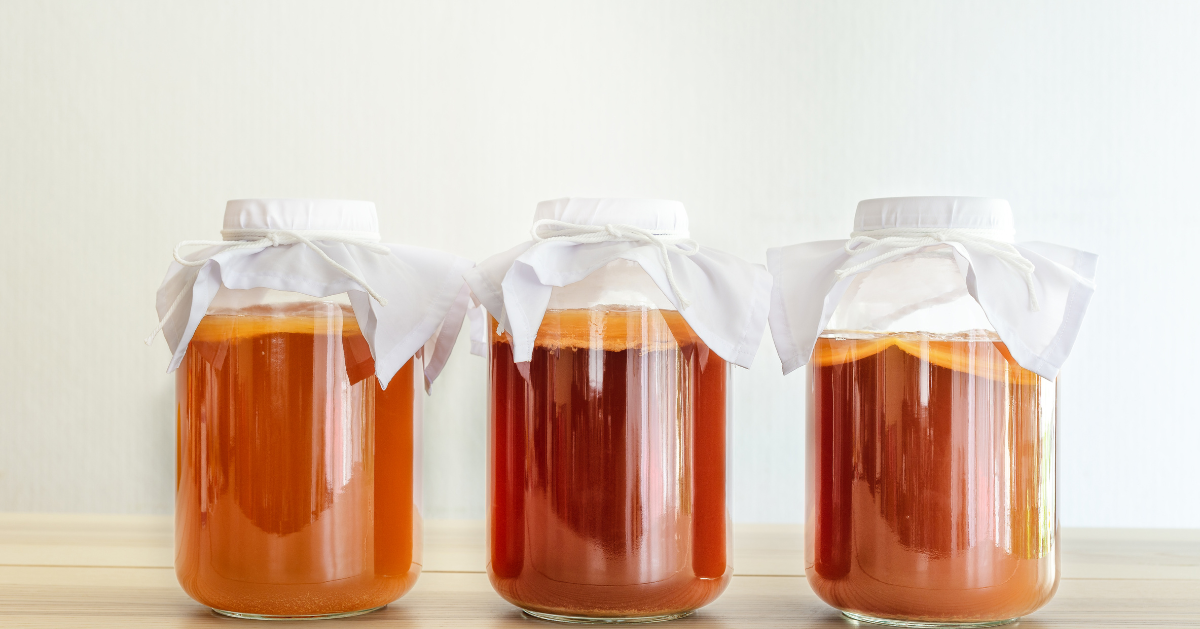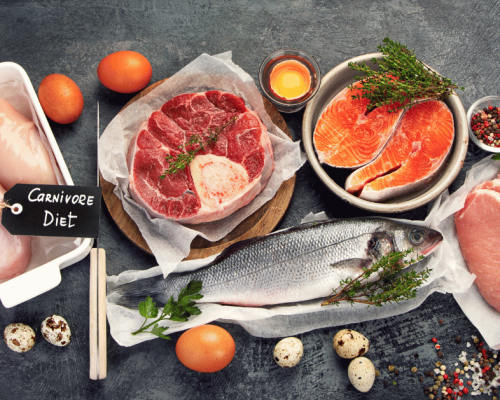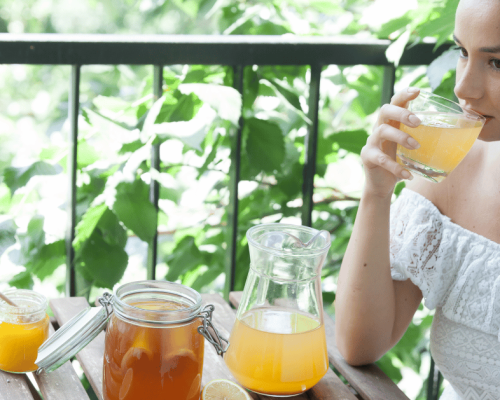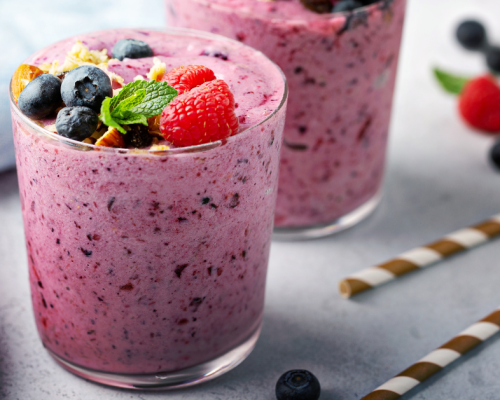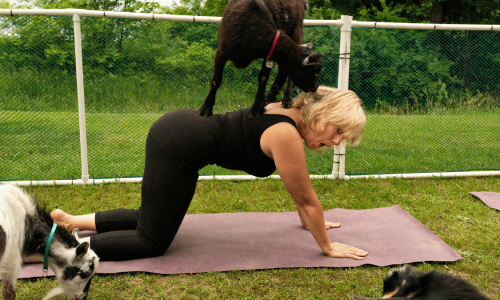Are you suffering from yeast infections and looking for a natural remedy? Meet kombucha, an ancient fermented tea known for its refreshing taste. We want to find out if kombucha can help with yeast infections.
In the world of kombucha, see how it is made with tiny living things. These little helpers might fight yeast infections. We will also learn about probiotics in kombucha and how they affect your gut—wondering if kombucha can help with yeast infections? Get ready to discover Kombucha’s secrets and explore if is Kombucha good for yeast infections.
Related post: Can You Drink Bone Broth While Fasting? Find The Truth
Table of Contents
ToggleWhat Is Kombucha?
Kombucha is a fermented tea beverage made by fermenting sweetened tea with a SCOBY (symbiotic culture of bacteria and yeast). The SCOBY is a pancake-like disk containing beneficial microorganisms. The brewing process involves steeping tea, usually black or green, with sugar to create a sweetened tea solution. After cooling, the SCOBY is introduced, initiating fermentation. This process typically takes one to two weeks, during which the SCOBY consumes sugar and transforms the sweet tea into kombucha, giving it a tangy flavor and carbonation.
After fermentation, the kombucha is strained and often bottled with added flavorings for extra taste. Though scientific evidence is ongoing, kombucha is lauded for potential health benefits, such as providing probiotics, antioxidants, and organic acids. It is available in various flavors and brands in stores as a refreshing beverage or as a base for mixed drinks and cocktails.
Is Kombucha Good for Yeast infection?
If you have a yeast infection, it is essential to exercise caution. Yeast infections, usually caused by Candida overgrowth, can be worsened by consuming kombucha or other fermented foods. The live yeast cultures in kombucha could exacerbate the issue by introducing more yeast to your body.
Avoid foods and beverages with live yeast cultures, such as kombucha, during a yeast infection. Focus on a low-sugar and low-carbohydrate diet to help curb yeast growth. Consulting a healthcare professional for proper treatment is also recommended. Keep in mind that kombucha products can vary in yeast and bacteria content, so their impact on a yeast infection may vary. If you have concerns about consuming kombucha while dealing with a yeast infection, it’s best to seek personalized advice from a healthcare provider.
Why do yeast infections occur?
Yeast infections are primarily caused by Candida albicans overgrowth. It occurs when microorganisms are imbalanced in the body, often due to factors like antibiotic use, hormonal changes, uncontrolled diabetes, a weakened immune system, tight clothing, poor hygiene, or a diet high in sugar and refined carbohydrates. These infections can affect the genital area, mouth (oral thrush), or skin folds.
Sexual activity can sometimes trigger or worsen yeast infections, and irritating hygiene products can disrupt the natural balance of microorganisms in the vaginal area. Treatment typically involves antifungal medications, either prescribed by a healthcare provider or available over the counter. However, consulting a healthcare professional for proper diagnosis and treatment is crucial, especially if the infection is recurring or a first-time occurrence.
When should I consume Kombucha?
The timing of when to consume Kombucha can vary depending on your personal preferences and how it affects your body. Here are some general guidelines:
- Morning: Some people start their day with a glass of Kombucha. It can provide a gentle energy boost due to its small caffeine content and may help with digestion, making it an excellent choice to kickstart your morning.
- Afternoon: Kombucha can be a refreshing and hydrating beverage for the afternoon. It can be a healthier alternative to sugary sodas or energy drinks.
- Before or after a meal: Many people find that consuming Kombucha before or after a meal can aid in digestion. The probiotics and enzymes produced during fermentation may help break down food more efficiently.
- As a snack: Kombucha can be a good mid-day or evening snack choice. It’s low in calories and can help curb your appetite due to its slight effervescence.
- As a post-workout drink: Some athletes and fitness enthusiasts enjoy Kombucha as a post-workout recovery drink. It can help replenish electrolytes and hydrate the body.
- Before bedtime: While Kombucha does contain caffeine (from the tea used in fermentation), it’s typically lower in caffeine than a cup of coffee. If you’re sensitive to caffeine, avoid it in the evening to prevent sleep disturbances.
- Throughout the day: Ultimately, the best time to consume Kombucha is when it fits into your daily routine, and you enjoy it the most. Some people prefer to sip it throughout the day to replace other beverages.
7 Other Natural Remedies for Yeast Infections
Though kombucha isn’t often advised as a standalone treatment for yeast infections, some natural therapies and dietary adjustments may help reduce the symptoms and avoid yeast infections.
- Probiotics: Probiotics are tiny, helpful germs that keep our body’s germs in balance. You can find them in yogurt, kefir, and pills. Some good probiotics are called Lactobacillus acidophilus and Lactobacillus rhamnosus. They make the lady’s parts healthy.
- Garlic: Garlic can fight yeast infections because it has natural antifungal powers. Some people put a peeled garlic piece into their vagina at night and take it out in the morning. But it’s essential to talk to a doctor before trying this.
- Tea Tree Oil: Tea tree oil can help with fungus problems on your skin. But, don’t use it directly on your skin because it might make it hurt. Instead, mix a few drops of tea tree oil with coconut oil and then put it on the part that’s bothering you.
- Coconut Oil: Coconut oil can fight fungus and might make you feel better if you have an itchy and uncomfortable yeast infection. Put a little coconut oil on the hurting spot whenever you need it.
- Boric Acid: Some women use boric acid capsules like medicine in their private area to help with yeast infections that keep coming back. But it’s essential to talk to a doctor or nurse about how much to use and how to use it correctly
- Dietary Changes: Eating less sugar and processed carbs can stop yeast infections because yeast likes sugar. Eat a balanced diet with lots of fruits, veggies, and whole grains to help prevent them.
- Cranberry Juice: Cranberry juice is often linked to preventing urinary tract infections (UTIs). Some people think it might also help stop yeast infections by keeping your urinary tract healthy. Choose cranberry juice without added sugar.
Conclusion
While kombucha offers various potential health benefits, it is not recommended as a remedy for yeast infections. Its live yeast cultures could worsen the condition. Instead, during a yeast infection, it is advisable to avoid foods and beverages like kombucha that contain live yeast cultures. Focus on a low-sugar and low-carbohydrate diet and consult a healthcare professional for proper treatment and guidance.
Other natural remedies, such as probiotics, garlic, tea tree oil, coconut oil, boric acid, dietary changes, and cranberry juice, may offer more suitable options to alleviate symptoms and prevent yeast infections. Always prioritize personalized advice from a healthcare provider when dealing with yeast infections.


